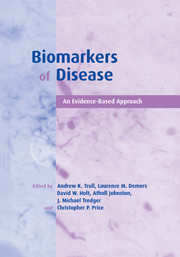Book contents
- Frontmatter
- Contents
- List of contributors
- Preface
- Part 1 Assessing and utilizing the diagnostic or prognostic power of biomarkers
- 1 Evidence-based medicine: evaluation of biomarkers
- 2 Development of biomarkers: the industrial perspective
- 3 Statistical approaches to rational biomarker selection
- 4 Using intelligent systems in clinical decision support
- Part 2 Biomarkers of kidney disease and dysfunction
- Part 3 Biomarkers of bone disease and dysfunction
- Part 4 Biomarkers of liver disease and dysfunction
- Part 5 Biomarkers of gastrointestinal disease and dysfunction
- Part 6 Biomarkers in toxicology
- Part 7 Biomarkers of cardiovascular disease and dysfunction
- Part 8 Biomarkers of neurological disease and dysfunction
- Part 9 Biomarkers in transplantation
- Index
4 - Using intelligent systems in clinical decision support
Published online by Cambridge University Press: 20 August 2009
- Frontmatter
- Contents
- List of contributors
- Preface
- Part 1 Assessing and utilizing the diagnostic or prognostic power of biomarkers
- 1 Evidence-based medicine: evaluation of biomarkers
- 2 Development of biomarkers: the industrial perspective
- 3 Statistical approaches to rational biomarker selection
- 4 Using intelligent systems in clinical decision support
- Part 2 Biomarkers of kidney disease and dysfunction
- Part 3 Biomarkers of bone disease and dysfunction
- Part 4 Biomarkers of liver disease and dysfunction
- Part 5 Biomarkers of gastrointestinal disease and dysfunction
- Part 6 Biomarkers in toxicology
- Part 7 Biomarkers of cardiovascular disease and dysfunction
- Part 8 Biomarkers of neurological disease and dysfunction
- Part 9 Biomarkers in transplantation
- Index
Summary
Introduction
The 1990s have seen two parallel technological revolutions, in bioscience and in information science, that are rapidly converging. Increasingly, biological concepts are being adopted by informaticians and chip technologies are being used for routine biological analysis. The emerging hybrid disciplines of bio-informatics and health informatics which they have spawned will be central to the effective clinical exploitation of the explosion of discoveries in the area of biomarkers.
Other chapters in this book describe many new biomarkers. These provide information about organ function and dysfunction to a degree of specificity and precision far beyond those in current use. However, the improvements in precision and specificity come at a price. The new tests have more focused functions. They require more discriminating use if they are to answer the discrete clinical questions for which they have been designed. For example, debate about the best ‘cardiac enzyme’ has been superceded by the need to select the best ‘marker of risk in the acute coronary syndrome’. Given the relatively increased unit cost and limited health resources, their widespread introduction presents the twin challenges of how to select the best marker for any particular diagnostic problem and how to maximize the information provided by the test. Intelligent decision support systems may provide some of the answers.
Clinical decision support systems
The practice of medicine is an inherently decision-based process.
- Type
- Chapter
- Information
- Biomarkers of DiseaseAn Evidence-Based Approach, pp. 32 - 42Publisher: Cambridge University PressPrint publication year: 2002



